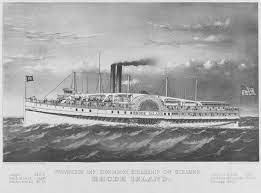
Although fairly strewn out and dramatized, Mr. Folsom's description of the United States and the cumulation of its dominance in the global economy was quite interesting to me. He began by describing the two schools of thought that were popular in the New World around the 1830s. The first of which was simple, the belief that the United States would grow through freedom. The second school of thought believed that the government should intervene to catch up with the economy of the United Kingdom via subsidies that jumpstart entrepreneurs.
So we come up with individuals like Edward Collins, who are political entrepreneurs, and others like Cornelius Vanderbilt who are market entrepreneurs. Political entrepreneurs tend to be a little bit shady because they like to partner with the government to hinder their competition and benefit themselves. On the other hand, market entrepreneurs contribute their own blood, sweat, and tears to an idea, without any help from the government. They are intrinsically motivated and often are the most efficient and effective compared to the politically motivated competition. This idea reigns true between steamship tycoons Vanderbilt and Collins. Edward Collins went to congress and requested $400,000 for the start-up of his steamship company, plus $3 million to actually build his ships. In an effort to catch up with the steamship wealth coming out of the United Kingdom, congress agreed to this subsidy and even provided Mr. Collins with several thousand more dollars in the long run.
Then came along Mr. Vanderbilt who set out to defeat Mr. Collins by taking passengers back and forth across the Atlantic with zero government subsidies. Although he had less funding (or maybe due to the fact), Vanderbilt was much more innovative on his cruise ships. He learned that if he traveled a little bit slower, he would save on fuel and coal, plus he sold food on the ships to bring in additional revenue. Cornelius Vanderbilt also had the idea to create the third class fair in which he packed people in for a reduced traveling fee. This is great because it increased his profits and allowed for a new market segment of individuals to utilize his services. On the whole, Vanderbilt did not cut corners. Collins continued to struggle with his luxury cruise business and repeatedly asked Congress for more and more funding so he could compete with the intrinsically motivated entrepreneur. Collins had ships sink, and lost half of his fleet; when they tried to rebuild they moved too hastily, and the new ship took on water. In conclusion, government-funded associations and organizations tend to be less innovatively and economically effective than their non-governmental counterparts.